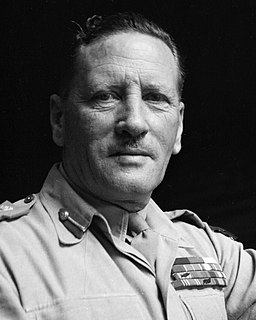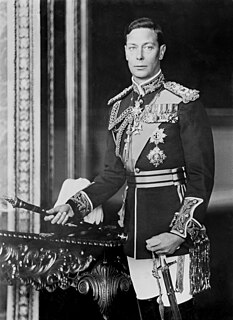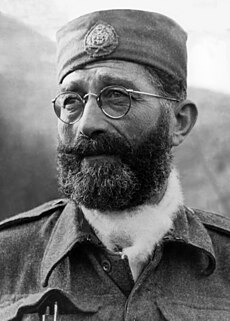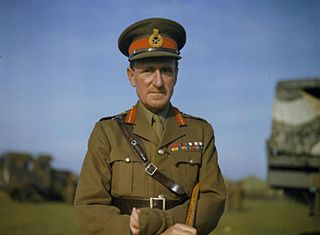 W
W'Abd al-Ilah of Hejaz,, was a first cousin and brother-in-law of King Ghazi of Iraq. 'Abd al-Ilah served as regent for King Faisal II from 4 April 1939 to 23 May 1953, when Faisal came of age. He also held the title of Crown Prince of Iraq from 1943.
 W
WField Marshal Harold Rupert Leofric George Alexander, 1st Earl Alexander of Tunis,, was a senior British Army officer who served with distinction in both the First World War and the Second World War and, afterwards, as Governor General of Canada, the 17th since Canadian Confederation.
 W
WGeneral Sir Kenneth Arthur Noel Anderson, was a senior British Army officer who saw service in both world wars. He is mainly remembered as the commander of the British First Army during Operation Torch, the Allied invasion of North Africa and the subsequent Tunisian Campaign. An outwardly reserved character, he did not court popularity either with his superiors or with the public. His American superior, General Dwight D. Eisenhower, wrote that he was "blunt, at times to the point of rudeness". In consequence he is less well known than many of his contemporaries. However, "he handled a difficult campaign more competently than his critics suggest, but competence without flair was not good enough for a top commander in 1944".
 W
WField Marshal Sir Claude John Eyre Auchinleck, was a British Army commander during the Second World War. He was a career soldier who spent much of his military career in India, where he rose to become Commander-in-Chief of the Indian Army by early 1941. In July 1941 he was appointed Commander-in-Chief of the Middle East Theatre, but after initial successes, the war in North Africa turned against the British, and he was relieved of the post in 1942 during the crucial Alamein campaign.
 W
WBhumibol Adulyadej, conferred with the title King Bhumibol the Great in 1987, was the ninth monarch of Thailand from the Chakri dynasty, titled Rama IX. Reigning since 9 June 1946, he was the world's longest-reigning current head of state from the death of Emperor Hirohito of Japan in 1989 until his own death in 2016, and is both the second-longest reigning monarch of all time and the longest-reigning monarch to have reigned only as an adult, reigning for 70 years and 126 days. During his reign, he was served by a total of 30 prime ministers beginning with Pridi Banomyong and ending with Prayut Chan-o-cha.
 W
WField Marshal Kodandera "Kipper" Madappa Cariappa, OBE was the first Indian Commander-in-Chief (C-in-C) of the Indian Army. He led Indian forces on the Western Front during the Indo-Pakistani War of 1947. He was appointed Commander-in-Chief of the Indian Army in 1949. He is one of only two Indian Army officers to hold the Five-star rank of Field Marshal; the other being Field Marshal Sam Manekshaw.
 W
WAir Marshal Sir Arthur "Mary" Coningham, was a senior officer in the Royal Air Force. During the First World War, he was at Gallipoli with the New Zealand Expeditionary Force, was discharged in New Zealand as medically unfit for active service, and journeyed to Britain at his own expense to join the Royal Flying Corps, where he became a flying ace. Coningham was later a senior Royal Air Force commander during the Second World War, as Air Officer Commanding-in-Chief 2nd Tactical Air Force and subsequently the Air Officer Commanding-in-Chief Flying Training Command.
 W
WAdmiral Sir Victor Alexander Charles Crutchley was a senior Royal Navy officer during the Second World War and a First World War recipient of the Victoria Cross, the highest award for gallantry in the face of the enemy that can be awarded to British and Commonwealth forces.
 W
WAdmiral of the Fleet Andrew Browne Cunningham, 1st Viscount Cunningham of Hyndhope, was a senior officer of the Royal Navy during the Second World War. He was widely known by his initials, "ABC".
 W
WAdmiral of the Fleet Sir John Henry Dacres Cunningham was a Royal Navy officer. A qualified senior navigator, he became Director of Plans at the Admiralty in 1930. He saw action as Commander-in-Chief of the Mediterranean Fleet during the Second World War with responsibility for the allied landings at Anzio and in the south of France. He served as First Sea Lord in the late 1940s: his focus was on implementing the Government's policy of scrapping many serviceable ships.
 W
WMarshal of the Royal Air Force William Sholto Douglas, 1st Baron Douglas of Kirtleside, was a senior commander in the Royal Air Force. After serving as a pilot, then a flight commander and finally as a squadron commander during the First World War, he served as a flying instructor during the inter-war years before becoming Director of Staff Duties and then Assistant Chief of the Air Staff at the Air Ministry.
 W
WFaisal II was the last King of Iraq. He reigned from 4 April 1939 until July 1958, when he was murdered during the 14 July Revolution together with numerous members of his family. This regicide marked the end of the thirty-seven-year-old Hashemite monarchy in Iraq, which then became a republic.
 W
WGeorge VI was King of the United Kingdom and the Dominions of the British Commonwealth from 11 December 1936 until his death in 1952. He was also Emperor of India from 1936 until 1947, when the British Raj was dissolved.
 W
WLeonid Aleksandrovich Govorov was a Soviet military commander. Trained as an artillery officer, he joined the Red Army in 1920. He graduated from several Soviet military academies, including the Military Academy of Red Army General Staff. He participated in the Winter War of 1939–1940 against Finland as a senior artillery officer.
 W
WLieutenant-General Sir Arthur Edward Grasett was a British-Canadian soldier who served with the British Army in Canada, England, India and China.
 W
WHaile Selassie I was the Emperor of Ethiopia from 1930 to 1974, and he had been Regent Plenipotentiary of Ethiopia from 1916. He is a defining figure in modern Ethiopian history. He was a member of the Solomonic dynasty who traced his lineage to Emperor Menelik I.
 W
WMarshal of the Royal Air Force Sir Arthur Travers Harris, 1st Baronet, commonly known as "Bomber" Harris by the press and often within the RAF as "Butcher" Harris, was Air Officer Commanding-in-Chief (AOC-in-C) RAF Bomber Command during the height of the Anglo-American strategic bombing campaign against Nazi Germany in the Second World War. In 1942, the British Cabinet agreed to the "area bombing" of German cities. Harris was given the task of implementing Churchill's policy and supported the development of tactics and technology to perform the task more effectively. Harris assisted British Chief of the Air Staff Marshal of the Royal Air Force Charles Portal in carrying out the United Kingdom's most devastating attacks against the German infrastructure and population, including the Bombing of Dresden.
 W
WAdmiral Sir Max Kennedy Horton, & Two Bars, SGM was a British submariner during the First World War and commander-in-chief of the Western Approaches in the later half of the Second World War, responsible for British participation in the Battle of the Atlantic. Max Horton was born in Anglesey to Robert Joseph Angel Horton and Esther/Hester Maude Goldsmid, of the famous Goldsmid/D'Avigdor Goldsmid Anglo Jewish family.
 W
WAlphonse Pierre Juin was a senior French Army general who became Marshal of France. A graduate of the École Spéciale Militaire class of 1912, he served in Morocco in 1914 in command of native troops. Upon the outbreak of the First World War, he was sent to the Western Front in France, where he was gravely wounded in 1915. As a result of this wound, he lost the use of his right arm.
 W
WIvan Stepanovich Konev was a Soviet general and Marshal of the Soviet Union who led Red Army forces on the Eastern Front during World War II, responsible for taking much of Axis-occupied Eastern Europe.
 W
WRodion Yakovlevich Malinovsky was a Soviet military commander in World War II, Marshal of the Soviet Union, and Minister of Defence of the Soviet Union in the late 1950s and 1960s. He contributed to the major defeat of Nazi Germany at the Battle of Stalingrad and the Battle of Budapest. During the post-war era, he made a pivotal contribution to the strengthening of the Soviet Union as a military superpower.
 W
WSir Robert Gordon Menzies,, was an Australian politician who twice served as Prime Minister of Australia, in office from 1939 to 1941 and again from 1949 to 1966. He played a central role in the creation of the Liberal Party of Australia, defining its policies and its broad outreach. He is Australia's longest-serving prime minister, serving over 18 years in total.
 W
WKirill Afanasievich Meretskov was a Soviet military commander. Having joined the Communist Party in 1917, he served in the Red Army from 1920. During the Winter War of 1939-1940 against Finland, he had the task of penetrating the Mannerheim Line as commander of the 7th Army. He was awarded the title of Hero of the Soviet Union shortly afterwards.
 W
WMichael I was the last King of Romania, reigning from 20 July 1927 to 8 June 1930 and again from 6 September 1940 until his forced abdication on 30 December 1947.
 W
WDragoljub "Draža" Mihailović was a Yugoslav Serb general during World War II. A staunch royalist, he retreated to the mountains near Belgrade when the Germans overran Yugoslavia in April 1941 and there he organized bands of guerrillas known as the Chetnik Detachments of the Yugoslav Army.
 W
WMohammad Al-Khamis Ben Youssef Ben Mohammed Al-Alaoui, known as Mohammed V, was Sultan of Morocco from 1927 to 1953; he was recognized as Sultan again upon his return from exile in 1955, and as King from 1957 to 1961. His full name was Sidi Mohammed ben Yusef, or Son of (Sultan) Yusef, upon whose death he succeeded to the throne. He was a member of the Alaouite dynasty.
 W
WField Marshal Bernard Law Montgomery, 1st Viscount Montgomery of Alamein,, nicknamed "Monty" and "The Spartan General", was a senior British Army officer who served in both the First World War and the Second World War.
 W
WAdmiral of the Fleet Louis Francis Albert Victor Nicholas Mountbatten, 1st Earl Mountbatten of Burma, was a British Royal Navy officer and statesman, an uncle of Prince Philip, Duke of Edinburgh, and second cousin once removed of Queen Elizabeth II. During the Second World War, he was Supreme Allied Commander, South East Asia Command (1943–1946). He was the last Viceroy of India (1947) and the first governor-general of independent India (1947–1948).
 W
WAlexander Alexandrovich Novikov was the Chief marshal of the aviation for the Soviet Air Force during Russia's involvement in the Second World War. Lauded as "the man who has piloted the Red Air Force through the dark days into the present limelight" and a "master of tactical air power", he was twice given the title of Hero of the Soviet Union, as well as a number of other Soviet decorations.
 W
WOlav V was King of Norway from 1957 until his death.
 W
WGeneral Sir Bernard Charles Tolver Paget, was a senior British Army officer during the Second World War. He commanded the 21st Army Group from June to December 1943 and was Commander-in-Chief (C-in-C) Middle East Command from January 1944 to October 1946. He was the senior serving general in the British Army.
 W
WMohammad Reza Pahlavi, also known as Mohammad Reza Shah, was the last Shah (King) of Iran from 16 September 1941 until his overthrow in the Iranian Revolution on 11 February 1979. Due to his status as the last Shah of Iran, he is often known as simply the Shah.
 W
WGiampaolo Di Paola is an Italian naval officer who served in the government of Italy as minister of defense from November 2011 to April 2013. He was the Italian military's Chief of Staff from 10 March 2004 to 8 February 2008 and served as Chairman of the NATO Military Committee from 2008 to 2011.
 W
WStanislav Gilyarovich Poplavsky was a general in the Soviet and Polish armies.
 W
WAdmiral Sir Bertram Home Ramsay, KCB, KBE, MVO was a Royal Navy officer. He commanded the destroyer HMS Broke during the First World War. In the Second World War, he was responsible for the Dunkirk evacuation in 1940 and planning and commanding the naval forces in the invasion of France in 1944.
 W
WSir Baber Shumsher Jang Bahadur Rana, GCVO, GBE, KCSI, KCIE was a member of the Rana dynasty who served as the Minister of Defence of Nepal in 1951. A prominent member of the Rana oligarchy, he fought valiantly in the First World War. He was the second son of Maharaja Sir Chandra Shamsher Jang Bahadur Rana and Bada Maharani Chandra Loka Bhakta Lakshmi Devi. He was the younger brother of Maharaja Sir Mohan Shamsher Jang Bahadur Rana and older brother of Field Marshal Sir Kaiser Shamsher Jang Bahadur Rana.
 W
WField Marshal His Highness Shree Shree Shree Maharaja Sir Padma Shumsher Jung Bahadur Rana was the hereditary prime minister of Nepal from 29 November 1945 to 30 April 1948 as the head of the Rana dynasty.
 W
WLieutenant General Sir Horace Clement Hugh Robertson, was a senior officer in the Australian Army who served in the First World War, the Second World War and the Korean War. He was one of the first graduates of the Royal Military College, Duntroon, to reach the ranks of major general and lieutenant general.
 W
WKonstantin Konstantinovich (Xaverevich) Rokossovsky was a Soviet and Polish officer who became Marshal of the Soviet Union, Marshal of Poland, and served as Poland's Defence Minister from 1949 until his removal in 1956 during the Polish October. He was among the most prominent Red Army commanders of World War II.
 W
WMichał Rola-Żymierski was a Polish high-ranking Communist Party leader, communist military commander and NKVD secret agent. He was appointed as Marshal of Poland by Joseph Stalin, and served in this position from 1945 until his death. He supported the 1981 imposition of Martial law in Poland.
 W
WField Marshal William Joseph Slim, 1st Viscount Slim,, usually known as Bill Slim, was a British military commander and the 13th Governor-General of Australia.
 W
WMarshal of the Royal Air Force Arthur William Tedder, 1st Baron Tedder, was a senior Royal Air Force commander. He was a pilot and squadron commander in the Royal Flying Corps in the First World War and he went on to serve as a senior officer in the Royal Air Force during the inter-war years when he served in Turkey, Great Britain and the Far East.
 W
WAleksandr Mikhaylovich Vasilevsky, was a Russian career-officer in the Red Army, attained the rank of Marshal of the Soviet Union in 1943. He served as the Chief of the General Staff of the Soviet Armed Forces (1942-1945) and Deputy Minister of Defense during World War II, and as Minister of Defense from 1949 to 1953. As the Chief of the General Staff from 1942 to 1945, Vasilevsky became involved in planning and coordinating almost all the decisive Soviet offensives in World War II, from the Stalingrad counteroffensive of November 1942 to the assaults on East Prussia, Königsberg and Manchuria.
 W
WArchibald Percival Wavell, 1st Earl Wavell, was a senior officer of the British Army. He served in the Second Boer War, the Bazar Valley Campaign and World War I, during which he was wounded in the Second Battle of Ypres. He served in the Second World War, initially as Commander-in-Chief Middle East, in which role he led British forces to victory over the Italians in western Egypt and eastern Libya during Operation Compass in December 1940, only to be defeated by the German Army in the Western Desert in April 1941. He served as Commander-in-Chief, India, from July 1941 until June 1943 and then served as Viceroy of India until his retirement in February 1947.
 W
WAndrey (Andrei) Ivanovich Yeryomenko was a Ukrainian-Soviet general during World War II and, subsequently, a Marshal of the Soviet Union. During the war, Yeryomenko commanded the Southeastern Front during the Battle of Stalingrad in summer 1942 and planned the successful defense of the city. He later commanded the armies responsible for the liberation of Western Hungary and Czechslovakia in 1945.
 W
WGeorgy Konstantinovich Zhukov was a Soviet general and Marshal of the Soviet Union. He also served as Chief of the General Staff, Minister of Defence, and was a member of the Presidium of the Communist Party. During the Second World War, Zhukov oversaw some of the Red Army's most decisive victories.